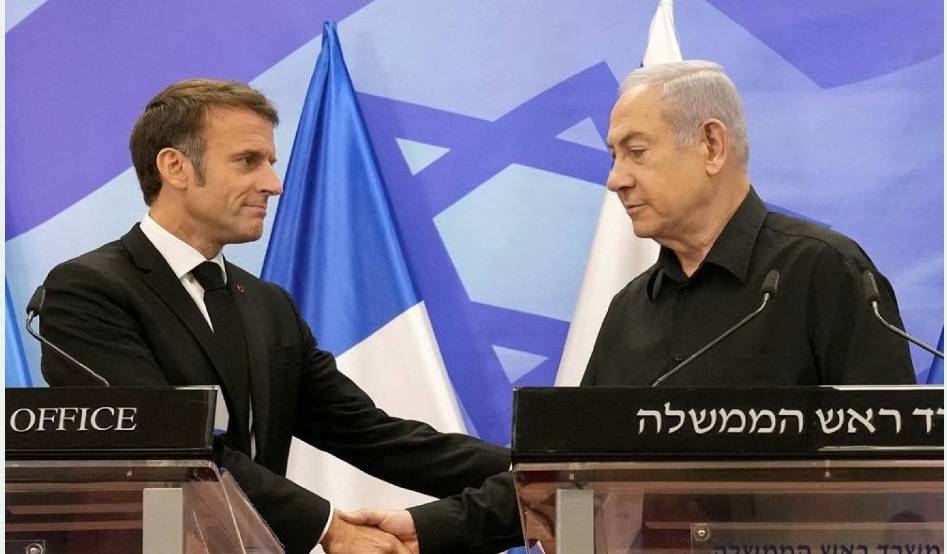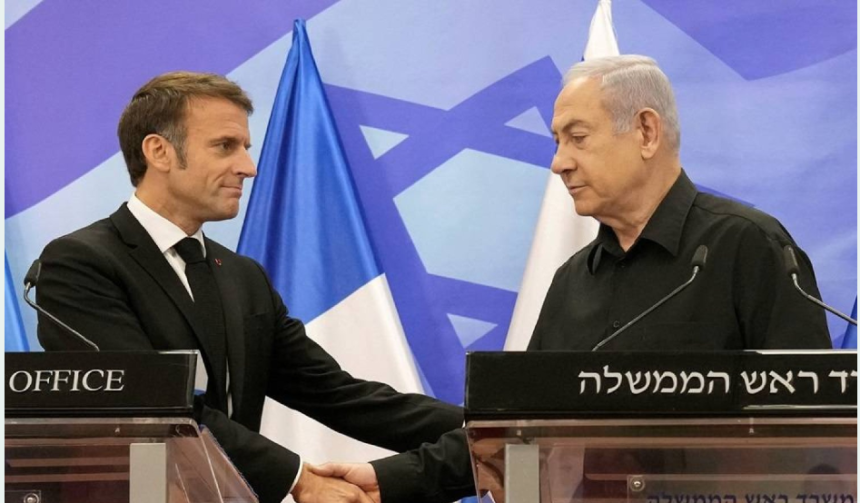Netanyahu Tells a tense exchange with French President Emmanuel Macron, Israeli Prime Minister Benjamin Netanyahu firmly rejected calls for a unilateral ceasefire in Lebanon, signaling the complexities of Israel’s security concerns amidst the escalating tensions in the region. Netanyahu’s stance reflects Israel’s broader strategic goals, and its unwavering focus on neutralizing threats emanating from Hezbollah, a militant group backed by Iran. This article delves into the motivations behind Netanyahu’s refusal, the historical context of Israel-Lebanon relations, and the implications for regional stability.
Historical Context of the Israel-Lebanon Conflict
The history of conflict between Israel and Lebanon is deeply intertwined with the rise of Hezbollah, a Shiite militant organization founded in the 1980s. Hezbollah emerged in response to Israel’s 1982 invasion of Lebanon during the country’s civil war. Over the decades, Hezbollah has positioned itself as a resistance movement against Israeli occupation, receiving substantial backing from Iran. With a formidable arsenal of rockets and fighters, Hezbollah has remained a persistent threat to Israel’s northern border.
The 2006 Lebanon War marked a significant escalation in hostilities. Hezbollah launched a cross-border raid, killing and capturing Israeli soldiers, sparking a 34-day conflict. While the war ended in a United Nations-brokered ceasefire, it did not resolve the underlying tensions. Hezbollah has since rebuilt its military capabilities, embedding itself deeper within Lebanese society and politics.
For Israel, Hezbollah represents not just a terrorist organization but an extension of Iranian influence. In recent years, the group has amassed over 150,000 rockets, capable of striking deep within Israeli territory. Netanyahu’s government views Hezbollah’s military buildup as an existential threat, compounded by its active role in Syria alongside Iranian forces.  For the more information click on this link
For the more information click on this link
Netanyahu Tells Refusal to a Ceasefire: Strategic Motivations
During his conversation with Macron, Netanyahu made it clear that Israel cannot afford to agree to a ceasefire while Hezbollah continues to stockpile weapons and expand its influence. From his perspective, a unilateral ceasefire would be perceived as a sign of weakness, Netanyahu Tells emboldening Hezbollah and its Iranian backers. Netanyahu’s government believes that military action is necessary to prevent Hezbollah from gaining further ground and to maintain Israel’s deterrence.
- Security Imperatives: Netanyahu’s rejection of a ceasefire is rooted in Israel’s national security doctrine, which prioritizes the preemptive neutralization of threats. The Israeli Defense Forces (IDF) have frequently targeted Hezbollah positions, aiming to degrade the group’s military infrastructure. Netanyahu has argued that a ceasefire without the disarmament of Hezbollah would be tantamount to giving the group time to regroup and rearm, a scenario Israel seeks to avoid at all costs.
- Regional Geopolitics: The broader geopolitical landscape also plays a role in Netanyahu’s stance. Lebanon is not just a battleground between Israel and Hezbollah but a proxy warfront in the larger struggle between Israel and Iran. By maintaining military pressure on Hezbollah, Israel seeks to counter Iranian influence in the Levant. Netanyahu has repeatedly warned that Iran’s foothold in Lebanon, Syria, a Netanyahu Tells nd Iraq constitutes a direct threat to Israeli security, making it imperative for Israel to prevent Hezbollah from gaining any advantage.
- Domestic Political Considerations: Netanyahu’s firm stance also reflects the domestic political dynamics within Israel. With a coalition government that includes right-wing and nationalist elements, any sign of concession could be seen as a betrayal of the country’s security. Netanyahu has built his political career on a tough stance against terrorism and maintaining Israel’s military superiority. Agreeing to a ceasefire, especially one that is not reciprocated by Hezbollah, could weaken his political standing among his supporters.
Macron’s Call for Restraint: France’s Role in the Region
French President Emmanuel Macron, like other Western leaders, has called for a cessation of hostilities in Lebanon, urging both sides to avoid further escalation. France has historically played a mediating role in Lebanon, Netanyahu Tells owing to its colonial history and cultural ties with the country. Macron’s government has expressed concerns about the humanitarian impact of the conflict, with thousands of Lebanese civilians caught in the crossfire between Hezbollah and Israel.
From Macron’s perspective, a ceasefire could provide a window for diplomatic efforts to de-escalate tensions and potentially restart peace talks. France, along with other European nations, Netanyahu Tells views the ongoing violence as a destabilizing factor in the already volatile Middle East. The French government has also been vocal in its criticism of Hezbollah’s role in exacerbating the conflict but has simultaneously pushed for diplomatic solutions rather than military confrontations.
Macron’s appeals to Netanyahu reflect a broader international consensus that seeks to avoid a full-scale war between Israel and Hezbollah, which could have devastating consequences not only for Lebanon but for the region as a whole.
The Risks of Escalation: A Wider Regional Conflict
While Netanyahu’s rejection of a ceasefire may be grounded in legitimate security concerns, it carries the risk of escalating the conflict further. Hezbollah, emboldened by Iranian support, Netanyahu Tells has demonstrated its willingness to retaliate against Israeli strikes. The group’s leader, Hassan Nasrallah, has repeatedly warned that any major Israeli offensive could trigger a broader conflict.  For the more information click on this link
For the more information click on this link
- Potential for War: Should hostilities between Israel and Hezbollah continue to escalate, the possibility of a full-scale war looms large. The 2006 Lebanon War saw widespread destruction in both Lebanon and northern Israel, Netanyahu Tells and a renewed conflict could be even more devastating, given Hezbollah’s expanded capabilities. Israeli cities, including Tel Aviv, could come under rocket fire, Netanyahu Tells while the IDF would likely launch extensive ground operations in southern Lebanon.
- Humanitarian Consequences: The humanitarian toll of such a conflict would be immense. Lebanon is still grappling with the aftermath of the 2020 Beirut port explosion, Netanyahu Tells a collapsing economy, and political instability. A new war with Israel would further strain Lebanon’s already fragile state. Thousands of civilians would likely be displaced, and critical infrastructure could be destroyed, exacerbating the country’s ongoing crises.
- International Involvement: A wider conflict could also draw in international powers, particularly the United States and Iran. The U.S. has long been a staunch supporter of Israel, Netanyahu Tells while Iran continues to back Hezbollah both financially and militarily. A direct confrontation between Israeli and Iranian forces, Netanyahu Tells either in Lebanon or Syria, could escalate into a broader regional war, dragging in other countries like Saudi Arabia and the Gulf states.
Conclusion: The Path Forward
Netanyahu’s rejection of a unilateral ceasefire underscores the complexities of the Israel-Lebanon conflict and the broader regional dynamics at play. While his stance is driven by Israel’s security concerns, it also highlights the limitations of military solutions in resolving deeply entrenched conflicts. The international community, Netanyahu Tells including leaders like Macron, faces the difficult task of balancing calls for restraint with the need to address the root causes of the conflict, namely Hezbollah’s military buildup and Iranian influence.
The path forward remains uncertain, but one thing is clear: without meaningful diplomatic efforts and a comprehensive strategy to address the underlying issues, the cycle of violence between Israel and Hezbollah is likely to continue. For now, Netanyahu remains resolute in his position, viewing a unilateral ceasefire as a non-starter in the face of the existential threats posed by Hezbollah and its Iranian backers. As tensions simmer, the world watches closely, hoping for a resolution that can prevent another devastating war in the Middle East. ALSO READ:-Banks Must Ride on AI and Big Tech Advantages, Not the Other Way: A Strategic Imperative for the Financial Sector 2024





